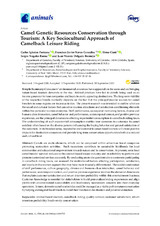Mostrar el registro sencillo del ítem
Camel Genetic Resources Conservation through Tourism: A Key Sociocultural Approach of Camelback Leisure Riding
| dc.contributor.author | Iglesias Pastrana, Carlos | |
| dc.contributor.author | Navas González, Francisco Javier | |
| dc.contributor.author | Ciani, Elena | |
| dc.contributor.author | Nogales Baena, Sergio | |
| dc.contributor.author | Delgado-Bermejo, J.V. | |
| dc.date.accessioned | 2020-09-21T06:48:38Z | |
| dc.date.available | 2020-09-21T06:48:38Z | |
| dc.date.issued | 2020 | |
| dc.identifier.uri | http://hdl.handle.net/10396/20457 | |
| dc.description.abstract | Camels are exotic elements, which can be comprised within adventure travel companies promoting ecotourism activities. Such recreations contribute to sustainable livelihoods for local communities and educational empowerment towards nature and its conservation. At present, some local camel breeds’ survival reduces to this animal-based leisure industry and its reliability to perform and promote customized services accurately. By conducting an on-site questionnaire to customers participating in camelback riding tours, we assessed the motivational factors affecting participation, satisfaction, and loyalty in this tourism segment that may have made it socially differentiated. The sixfold combination of staff performance, culture geography, diverse and humane close interaction, camel behavior and performance, sociotemporal context, and positive previous experience involves the elemental dimensions that explain customer satisfaction and return intention probability within this entertainment business. Customer knowledge is essential for stakeholders to build personalized riding experiences and align profits with environmental sustainability and biodiversity mainstream concerns into their everyday operations. In turn, domestic camel tourist rides could be managed as a viable path to nature conservation by helping endangered local breeds to avoid their functional devaluation and potential extinction. | es_ES |
| dc.format.mimetype | application/pdf | es_ES |
| dc.language.iso | eng | es_ES |
| dc.publisher | MDPI | es_ES |
| dc.rights | https://creativecommons.org/licenses/by/4.0/ | es_ES |
| dc.source | Animals 10(9), 1703 (2020) | es_ES |
| dc.subject | Animal-based tourism | es_ES |
| dc.subject | Camelback riding | es_ES |
| dc.subject | Quality service | es_ES |
| dc.subject | Customer satisfaction | es_ES |
| dc.subject | Return intention probability | es_ES |
| dc.subject | Biodiversity conservation | es_ES |
| dc.title | Camel Genetic Resources Conservation through Tourism: A Key Sociocultural Approach of Camelback Leisure Riding | es_ES |
| dc.type | info:eu-repo/semantics/article | es_ES |
| dc.relation.publisherversion | https://doi.org/10.3390/ani10091703 | es_ES |
| dc.relation.projectID | Gobierno de España. APCIN-2016-00011-00-00 | es_ES |
| dc.rights.accessRights | info:eu-repo/semantics/openAccess | es_ES |

